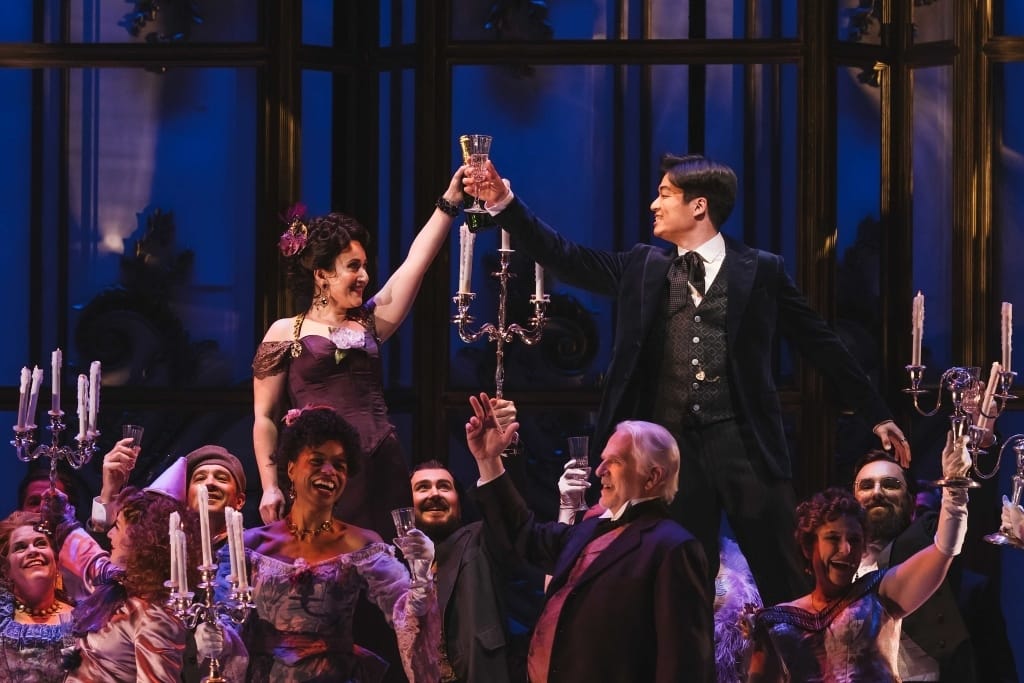- Gathering Note
- Posts
- A Grand and Intimate La traviata at Seattle Opera
A Grand and Intimate La traviata at Seattle Opera

Mané Galoyan and Duke Kim in Seattle Opera’s La Traviata. Photo Credit: Sunny Martini
Review originally published at Seen and Heard International
Verdi’s La traviata is one of the handful of operas that is instantly recognizable by the wider public. Since its premiere in 1853, it has never left the repertoire. Its legendary arias, such as “Sempre libra,” and its tragically realistic portrayal of a doomed love story captivate audiences to this day. From Maria Callas onward, every great soprano has tried to master the complex character of Violetta. Yet La traviata’s rich history and traditions pose a challenge to opera companies: how can you make this classic opera fresh and engaging for an audience that knows it by heart, even if they have never seen it live?
Fortunately for Pacific Northwest opera-goers, the Seattle Opera has risen to the challenge. Its current production of La traviata creates a grand experience by focusing on the work’s most intimate moments. The three main characters — Violetta, Alfredo and Germont — live in a world of decadence, privilege, and hierarchy, where lavish parties and balls contrast with country estates. The production’s sets reach from floor to ceiling, giving an imposing sense of scale. Though the sets at first glance might give the impression that this is a more traditional production, sharp lines and clean margins give it a modern touch and introduces an uneasy sense of isolation. Seattle Opera’s blithe chorus and crisp playing from the orchestra underscore the social atmosphere and the drama of the story. The lively atmosphere they create, makes it seem possible that anyone, especially Violetta and Alfredo, could ignore their troubles in the name of love.
The production anchors our attention on the deeply personal aspects of Verdi’s opera. Violetta, Alfredo and Germont are animated by deep feelings that are not always pure. Violetta struggles to love Alfredo, knowing her chronic illness is always near. Alfredo gives himself fully to Violetta, even despite the scandal. Meanwhile, Germont is so insecure about the state of his family’s reputation that he has no problem pitting Violetta against his son.
The opera’s story of sadly approachable problems from our own society — with its own share of injustice, class, image, and insecurity — is brought to life by a strong cast, led by Mane Galoyan’s Violetta. She portrays Violetta’s mood swings — from carefree to enthralled to fragile — with skill and emotion. Duke Kim’s naive Alfredo balances Galoyan with his rich tenor, expressing the intensity of young love. And Joo Won Kang’s dark baritone conveys the inner conflict of a father who makes an impossible request of his son’s lover.
Often in La traviata, there is a weak link among the three principal singers. Not so when I was in the audience. Galoyan achieved the emotional and technical demands required for Violetta, but did so as a partner to Kim and Kang. Kim’s Alfredo was convincing. I believed in his love for Violetta because of how well his tenor matched Galoyan’s soprano. Likewise, when Germont demands Violetta break up with his son, you could feel the tension as Kang pushed and Galoyan resisted.
Closing out the 2022/2023 season with La traviata may seem like a predictable choice of giving the people what they want. But this production and the singers assembled for the second cast are well worth experiencing. The production gleams with a clean modern aesthetic, the chorus is splendid, and the cast is engaging. The show will uncover new layers of meaning for people deeply familiar with Verdi’s masterpiece and the moral messages behind it. For those new to opera, this is a perfect introduction.